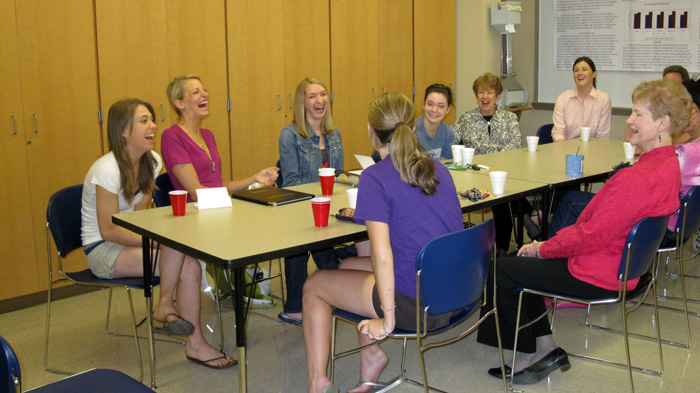Mentoring Tutorials
Without inspiration, the best powers of the mind are dormant. There is a tinder in us which needs to be quickened with sparks.
~Johann Gottfried von Herder (in Dungy & Whittaker, 2010, p. 185)
Bradley University Department of Family and Consumer Sciences. Two incoming freshmen are selected each year to receive the Arnold-Wheeler Scholarship. Each student is paired with a faculty member to work on a research project over their four years at Bradley. The eight students in the program meet once a month during the year to present research ideas and get feedback from their peers and faculty. Dr. Nina Collins, pictured front right, is one of the founders of the program at Bradley.
Although research-based mentoring relationships may be considered "highly effective for students and 'immensely satisfying' for professors" (Berrett, 2011,¶ 1), both mentors and mentees can improve their mentoring experiences when they participate in mentoring-based training and development.
An evaluation of the impact of mentor involvement in the Wisconsin Mentoring Seminar found that mentors who completed this course "discuss[ed] expectations with their undergraduate researchers," "consider[ed] issues of diversity," and shared mentoring experiences "with peers and faculty" more than mentors who did not participate in mentor training. Undergraduate researchers mentored by faculty who completed mentor training compared prior experiences with mentors who had not had any training and indicated that "mentors [with training] were more available to them, were more interested in them as individuals, and gave them more independence" (Pfund, Pribbenow, Branchaw, Lauffer & Handelsman, 2006, p. 474). Reddick, Griffin, & Cherwitz (2011) also reported gains, including an increased emphasis on diversity, among graduate student mentors who participated in mentor training at the University of Texas at Austin.
Both mentors and mentees should benefit from working with KON's Self-Managed Mentoring modules. Wisconsin's Research Mentor Training and RCR's Mentoring are resources designed for mentors. webGuru's Guide for Undergraduate Research has materials developed specifically for undergraduate research mentees.
References
Berrett, D. (2011, Jan 10) . Mentoring 101. Inside Higher Ed, Retrieved from www.insidehighered.com/news/2011/01/10/mentoring_is_good_teaching_in_college
Pfund, C., Pribbenow, C. M., Branchaw, J., Lauffer, S. M., & Handelsman, J. (2006).
Reddick, R. J., Griffin, K. A., & Cherwitz, R. A. (2011). Answering President Obama's call for mentoring: It's not just for mentees anymore. Planning for Higher Education, 39(4), 59-65.
